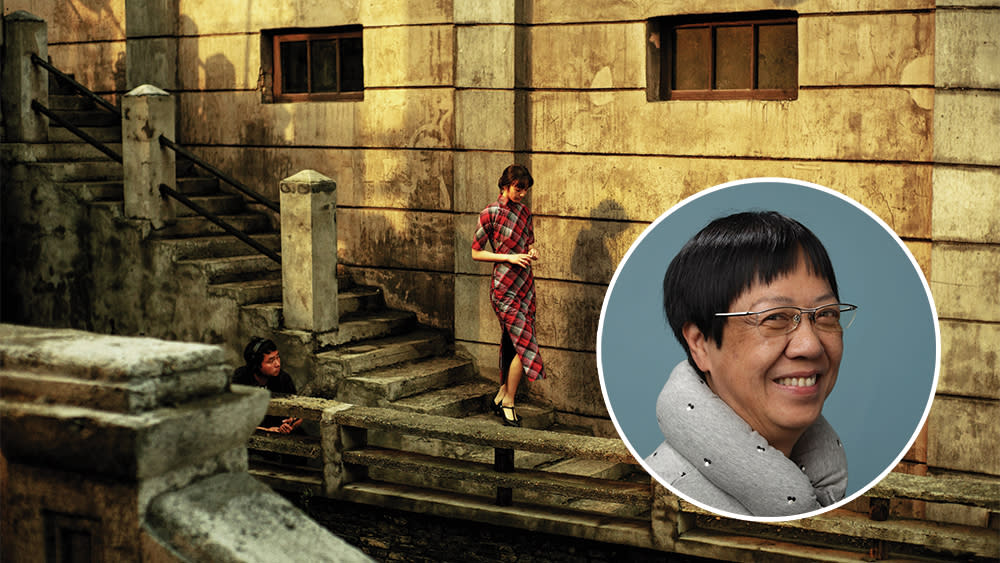Ann Hui: Asian Filmmaker of the Year Quietly Built Hefty Resume

Ann Hui is a quiet, unflashy type whose merits — honesty, diversity and lack of pre-conceptions — are the kind of humane, long-lasting values that rise to the surface over time, rather than in a bubble of manufactured PR.
She receives the Asian Filmmaker of the Year Award from the Busan Intl. Film Festival. That is an award that in previous years has gone to giants of the Asian scene including Mohsen Makhmalbaf, Hou Hsiao-hsien and Yash Chopra.
Hui receives the award having recently made one of her most commercially successful films, “A Simple Life,” and one of her biggest-budget, “The Golden Era,” which premiered last month as the closing film of the Venice festival.
A leader of the Hong Kong New Wave in the 1980s, Hui is arguably closer to the diversity and humanity of Hong Kong than any of the big-name men: John Woo, Wong Kar Wai, Johnnie To or Tsui Hark. And she is better, too, at describing the modern Asian experience.
Hui was born in 1947 in Manchuria, to a father who was Chinese and a mother who was Japanese. Escaping the turmoil of revolutionary China, they arrived in Hong Kong when Hui was 5.
That family background may help to explain her interest in displaced and marginal people, her horror of nationalism and ethnocentrism.
Her semi-autobiographical “Song of the Exile” depicts a schoolgirl being pulled in one direction by Chinese grandparents who want to wash away the bourgeois, and the Japanese influences of the girl’s mother.
After an early interest in literature, Hui went to film school in London, where she met director King Hu (“A Touch of Zen”). On returning to Hong Kong she was briefly taken under his wing, but quickly plunged into TV production in order to provide financial support for her family.
Hong Kong’s commercial broadcaster TVB is famous for its on-the-job training school, where the likes of director Hark and actors Chow Yun-fat and Tony Leung Chiu-wai honed their skills. At the broadcaster, Hui’s colleagues were actors Patrick Tam and Law Kar-ying, and fellow Hong Kong New Wave helmer Yim Ho.
Although she did not think she was ready for it, Hui was quickly employed as a producer-director with a small production team making episodes of TVB’s top shows “CID” and “Wonderfun.” After two years she had a substantial body of work.
Much of what she did was making films based on real criminal cases, a skill she turned to her advantage when the Independent Commission Against Corruption, Hong Kong’s anti-graft body, decided that TV would be a powerful means to get its message across to a skeptical public. Hui shot numerous episodes of shows that have stood the test of time and ICAC films are regularly unearthed for theatrical play at festivals. Her first feature film, 1979’s “The Secret,” was also based on real events.
Since then Hui’s work has ranged widely from comedy-horror (1980 “The Spooky Bunch”); horror (2001 hit “Visible Secret”); martial arts (1987 two-parter “The Romance of Book and Sword” and “Princess Fragrance”) and she has directed two adaptations of literature by Eileen Chang, 1984’s “Love in a Fallen City” and 1997’s “Eighteen Springs,” which was also the source for Ang Lee’s “Lust, Caution.”
A unifying theme is Hui’s lack of involvement in screenwriting. Unlike Wong, Tsui or To, who are nexuses of wider production-finance initiatives, Hui is essentially a jobbing director who takes finished scripts and works one assignment at a time.
That has meant she has worked for a large number of studios and producers — including some unusual ones such as shlockmeister Wong Jing, who said her credentials burnished his slate. That, in turn has meant that Hui has been criticized as uneven or lacking an easily defined filmmaking style.
Hui, however, has little interest in personal style and focuses instead on subject matter, events and characters — and she is willing to adapt style and genre to fit. She cares about honesty, attention to detail and humanity, and sometimes extracts exemplary performances from her actors. Josephine Siao Fong won Berlin’s Silver Bear for her performance in Hui’s “Summer Snow” and Simon Yam gives one of his best performances in her “Night and Fog.”
“The Golden Era,” which gets a gala screening in Busan, is a lengthy biopic about a novelist who in her lifetime was associated with scandal, but later became regarded as one of China’s best writers of the 20th century. Reviewers have said that the film, which tells Xiao Hong’s story from multiple points of view, fails to fully enlighten. But Hui’s response is that truth is rarely whole, objective or one-dimensional.
Related stories
Europeans Keep Their Eyes on Busan Prize
BUSAN: Currents Jury Member Bong Joon-ho: 'I Love Classic B/W Movies'
BUSAN: Ferry Disaster Aftermath Continues to Dominate Fest Forefront
Get more from Variety and Variety411: Follow us on Twitter, Facebook, Newsletter
